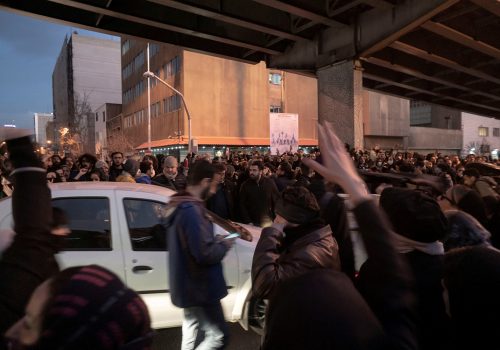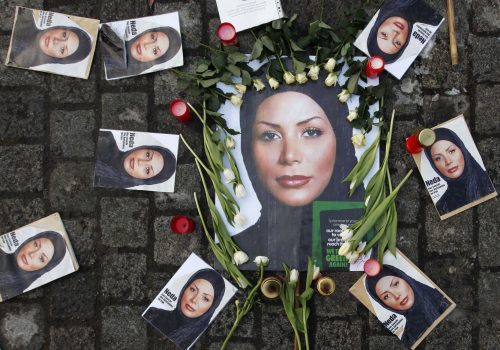The defenestration of Bucharest: How Europe can help Iranian survivors of rights abuses
The “Defenestrations of Prague” famously refer to incidents in which notables were thrown out of windows—sometimes as the consequence of religious strife in the Kingdom of Bohemia and sometimes at the hands of Soviet security services in Czechoslavakia.
This dark tradition of Eastern Europe continued last month, when a former Iranian judge named Gholamreza Mansouri was found dead after falling from a window at his Bucharest hotel on June 19.
Mansouri—wanted by the Iranian government on corruption charges for an apparent 500,000 euros bribe and by human rights groups for torture—had allegedly entered Germany on a Schengen visa. As soon as his presence in Germany was publicized, new reports indicated he had already fled to Romania, where he was arrested and awaiting possible extradition back to Iran, with police monitoring him at his hotel.
Whether Mansouri’s death was a suicide or a murder is not immediately clear. Given the Islamic Republic of Iran’s history of extraterritorial assassinations and the weight of Mansouri’s secrets, a targeted killing by the Iranian state is not beyond the realm of possibility.
Regardless of cause, Mansouri’s death means that his many victims—Iranian journalists and activists, who were detained and tortured on his orders—were robbed of a chance at justice that had already long eluded them.
Iranian victims of human rights abuses have grown accustomed to the disappointing reality that justice will not be delivered in Iranian courts especially in a judiciary headed by Ebrahim Raisi, a notorious human rights abuser responsible for the summary executions of thousands of Iranian prisoners in the summer of 1988.
However, there has been recent cause for hope. The growing number of trials in Germany against perpetrators of atrocities in Syria, as well as the pre-trial detention in Sweden of Hamid Nouri for his role as an accomplice to Raisi’s killings, have renewed the resolve of many Iranian survivors to seek redress in European courts for torture and crimes against humanity.
It is now time for Europe to take these complaints seriously and renew its commitment to prosecuting these international crimes, especially as Iranian survivors increasingly become European citizens and residents. Mansouri’s death reveals errors from which European authorities need to learn in order to avoid another futile outcome.
First, it is worth examining why Mansouri was permitted to remain an open target. The Islamic Republic’s penchant for eliminating dissent or defection in the style of Vladimir Putin’s Russia is no secret. Given Mansouri’s insider knowledge of the structures and functions of the country’s judiciary, the Iranian state could not afford a highly publicized trial in which he would reveal information about the inner workings of the state. Nor could Iran tolerate Mansouri flipping as an informant.
Press freedom group Reporters without Borders, which filed criminal complaints in Germany and Romania, asked authorities to detain Mansouri pending a decision on torture allegations against him—their request was ignored. It is unclear why Mansouri was not afforded better police vigilance in Romania, where he was left vulnerable to powerful forces seeking to silence him. It is difficult to not see what transpired here as a scene reminiscent of the musings of a John le Carré novel, caused by the negligence or even complicity of European authorities.
Second, politics and diplomacy should not override Europe’s international obligations to end impunity for gross human rights violations. Over the past two years, Europe has been keen to distinguish itself from the Trump administration’s damaging “maximum pressure” campaign on Iran. The result is an overcorrection in which Europe has responded limply to the Iranian state’s many human rights abuses, including violent crackdowns on peaceful protesters in November 2019 that resulted in hundreds killed and thousands imprisoned. To avoid the accusation that they favor realpolitik over closing the impunity gap on Iran, European governments can prioritize the trials of Iranian perpetrators who enter their territory for their involvement in torture, crimes against humanity, and other serious international crimes.
Indeed, we are likely to see more perpetrators leaving Iran and entering Europe’s borders. As the volatile political situation in Iran shifts power dynamics and corruption charges are increasingly leveled against Iranian officials, those who fall into disfavor with the regime may seek refuge elsewhere. War Crimes units dedicated to investigating and prosecuting atrocity crimes are woefully understaffed and underfunded, while issues like counterterrorism are given top billing and priority. European governments should redirect resources to bolster the ability of War Crimes units to handle an inflow of cases, collect evidence of abuses, and collaborate with human rights groups working to document atrocities in Iran.
Third, Mansouri’s death does not extinguish the possibility of investigating the crimes against humanity in which he allegedly participated. In Germany, a structural investigation can be opened when there is evidence of a crime, but perpetrators have not yet been definitively identified. This prosecutorial strategy is the reason we have seen a surge of cases relating to Syria. Mansouri’s attacks on press freedom were not isolated incidents—they were part of crimes against humanity which involved many other perpetrators and encompassed a broader range of underlying conduct. By opening a structural investigation into Iranian atrocities, German or other European prosecutors can be better prepared to arrest Mansouri’s accomplices if and when they ever find themselves in Europe.
Iranian survivors deserve more than just rhetoric about Europe’s commitment to justice—they deserve action. With ongoing travel restrictions, targeted sanctions, and general isolationism, the most responsible perpetrators of human right abuses in Iran seldom travel to Europe. This is all the more reason to seize the opportunity and hold them accountable when they do.
Gissou Nia is a human rights lawyer and nonresident fellow at the Atlantic Council. She is also the board chair of the Iran Human Rights Documentation Center. Follow her on Twitter: @GissouNia.
Amanda Ghahremani is an international human rights lawyer, co-investigator with the Canadian Partnership for International Justice and Research Associate at the Simone de Beauvoir Institute. Follow her on Twitter: @amandaghahreman.
Image: Forensic medicine staff carry a body bag, allegedly containing the remains of Gholamreza Mansouri, outside a hotel in downtown Bucharest, Romania, June 19, 2020. Inquam Photos/Octav Ganea via REUTERS


